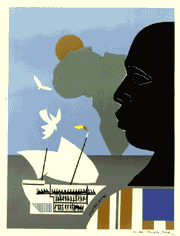1763-1815:
The American Revolution & A New Nation
Highlights
During the course of the slave trade, millions of Africans
became involuntary immigrants to the New World. Some African
captives resisted enslavement by fleeing from slave forts
on the West African coast. Others mutinied on board slave
trading vessels, or cast themselves into the ocean. In the
New World there were those who ran away from their owners,
ran away among the Indians, formed maroon societies, revolted,
feigned sickness, or participated in work slow downs. Some
sought and succeeded in gaining liberty through various legal
means such as "good service" to their masters,
self-purchase, or military service. This area explores the
methods used by Africans and their American-born descendants
to resist enslavement, as well as to demand emancipation
and full participation in American society. Strategies varied,
but the goal remained unchanged: freedom and equality.
African American Odyssey: Slavery--The
Peculiar Institution
People, Places and Events
- Crispus Attucks (1723?-1770): The Boston Massacre
reflected growing tension between Great Britain and its
American colonies. Crispus AttucksAfrican-American sailor
was the first to fall.
Sailor,
martyr of the Boston Massacre.
First
Hero of the American Revolution.
- Benjamin Banneker (1731-1806): Successfully predicted
a solar eclipse, published an almanac, surveyed the site
of the District of Columbia (D.C.)
Benjamin
Banneker
Mathematician
and Astronomer
Self
Educated Scientist
- Phillis Wheatley (1753?-1784): First African American
poet to be published
Phillis
Wheatley
First
African American to Publish
|
